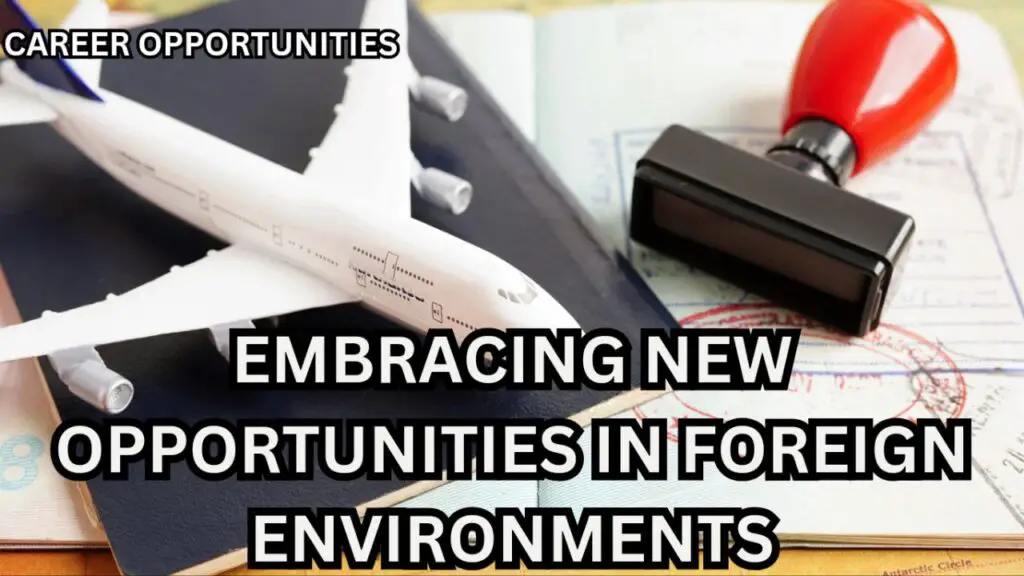
Table of Contents
Introduction to Embracing New Opportunities in Foreign Environments for Education or Career
Do you want to know how to adjust in foreign environments? It’s no news that after getting scholarships, fellowships, or even international internships, adjusting to the foreign environments and the limitless opportunities present can be a chore. Starting a new journey in foreign environments for academic or professional purposes can be an exciting yet challenging experience. Moving to an unfamiliar environment requires a lot of courage, adaptability, and proactive strategies. Whether you are going abroad for further education, seeking new job opportunities, or advancing your career, it is essential to have a comprehensive guide that can help you navigate and thrive in your new surroundings. Here’s a comprehensive guide to help you navigate and thrive in foreign environments.
10 Strategies for Embracing New Opportunities in Foreign Environments for Education or Career
Research and Prepare:
- Before setting foot in foreign environments, conduct thorough research about the culture, customs, language, and social norms prevalent there. Familiarize yourself with the local laws, transportation systems, healthcare facilities, and essential services. Understanding the socio-political landscape and economic factors will provide valuable insights into the local context.
Cultivate Cultural Competence:
- Embrace diversity and strive to understand the cultural nuances of your new environment. Learn basic greetings and expressions in the local language to facilitate communication and demonstrate respect for the host culture. Engage in cultural exchange activities, attend local events, and immerse yourself in the community to broaden your perspective and foster meaningful connections.
Embrace Flexibility:
- Flexibility is key to adapting to unfamiliar situations and overcoming challenges. Be prepared to adjust your expectations, routines, and attitudes to accommodate cultural differences and unforeseen circumstances. Embrace ambiguity and approach new experiences with an open mind, recognizing them as opportunities for personal and professional growth.
Develop Interpersonal Skills:
- Building rapport and forging meaningful relationships with locals and fellow expatriates is essential for integration and social support. Practice active listening, empathy, and cross-cultural communication skills to establish rapport and bridge cultural divides. Seek out networking opportunities, join community groups, and participate in social activities to expand your social circle and build a support system.
Maintain a Positive Mindset:
- Cultivate a positive mindset and adopt a proactive approach to overcome challenges and setbacks. Focus on the opportunities and adventures that await you in your new environment, rather than dwelling on homesickness or cultural differences. Celebrate small victories, stay resilient in the face of adversity, and maintain a sense of optimism about your journey ahead.
Seek Support and Guidance:
- Don’t hesitate to seek support and guidance from mentors, peers, and local expatriate communities. Reach out to academic advisors, career counsellors, and cultural orientation programs offered by educational institutions or employers to access resources and guidance tailored to your needs. Engage with online forums, social media groups, and expatriate networks to connect with fellow newcomers and exchange insights and advice.
Establish Routine and Balance:
- Establishing a daily routine and maintaining a healthy work-life balance is crucial for your well-being and productivity in a new environment. Prioritize self-care practices, such as exercise, meditation, and hobbies, to manage stress and promote mental and physical health. Set realistic goals, manage your time effectively, and allocate time for leisure activities and cultural exploration to enrich your experience abroad.
Adapt to Educational or Professional Environment:
- Familiarize yourself with the academic or professional expectations, norms, and standards prevalent in your new environment. Attend orientation sessions, workshops, or training programs offered by educational institutions or employers to gain insights into academic or workplace culture and expectations. Seek feedback, ask questions, and proactively seek opportunities for skill development and professional growth.
Embrace Cultural Exchange:
- Embrace opportunities for cultural exchange and cross-cultural collaboration to enrich your educational or professional experience abroad. Engage in group projects, collaborative research, or community service initiatives that foster intercultural understanding and cooperation. Share your cultural perspectives and experiences while remaining receptive to diverse viewpoints and perspectives.
Reflect and Adapt:
- Continuously reflect on your experiences, challenges, and achievements, and adapt your strategies and behaviours accordingly. Cultivate self-awareness, resilience, and adaptability as you navigate the ups and downs of life in a new environment. Celebrate your progress, embrace the lessons learned from setbacks, and remain open to new opportunities and possibilities that arise along the way.
Conclusion
In conclusion, adjusting to foreign evironments for work or school is a life-changing experience that calls for perseverance, fortitude, and an open mind. Living and working overseas can present challenges, but you can also take advantage of opportunities for personal and professional growth by accepting cultural diversity, developing interpersonal skills, and keeping an optimistic outlook. As you set out on this thrilling journey of cultural immersion and self-discovery, do not forget to remain inquisitive, adaptable, and proactive.
For further knowledge and useful tips on how to adjust in foreign environments, check out these tips on Quora.
Candidates also apply to:
The 2024 MILEAD Fellows Program for Young African Women Leaders
Grant Opportunity: Apply Now for the British Institute BIEA Bringing Research Home Grant 2024/2025!
University of Manitoba Scholarships 2024: Study in Canada Funded!
Germany SBW Berlin Scholarships for International Students In 2024




